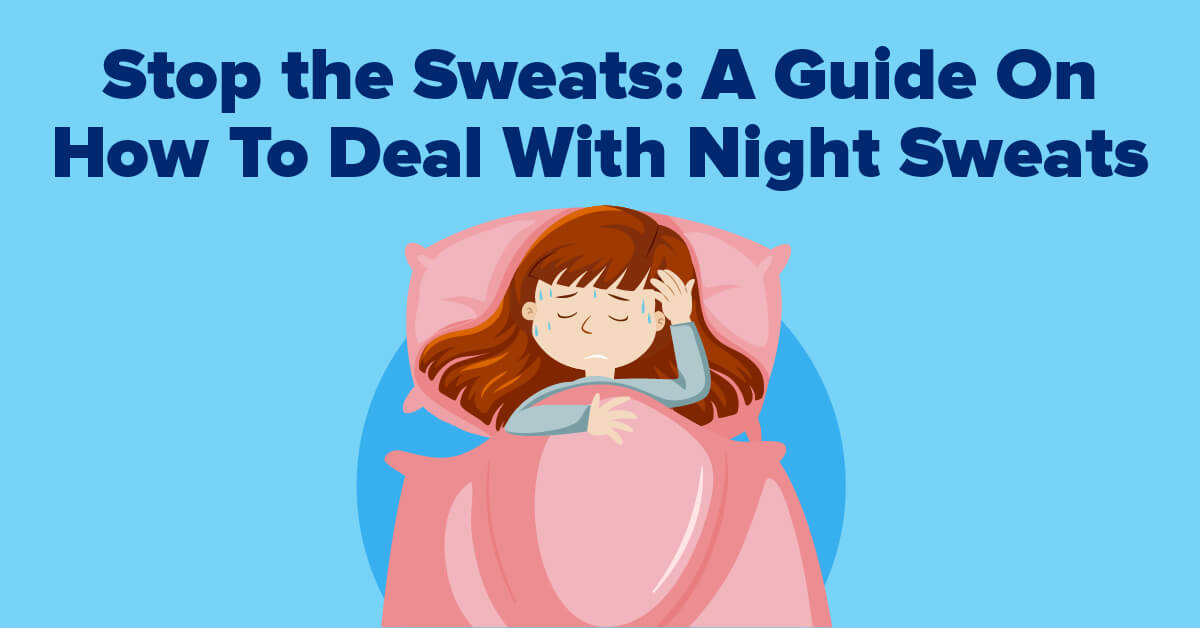Sweating at night can be an uncomfortable experience. Not only will you chafe your skin against the materials around you, but the mental strain of waking up covered in a pool of moisture is disturbing.
There are many causes for excessive sweating during the night and just as many ways to treat the problem. We have created a guide to help you navigate your body and understand why this is happening. In this guide, you can find prevention techniques to get yourself back to the calming nights you deserve.
What Are Night Sweats?
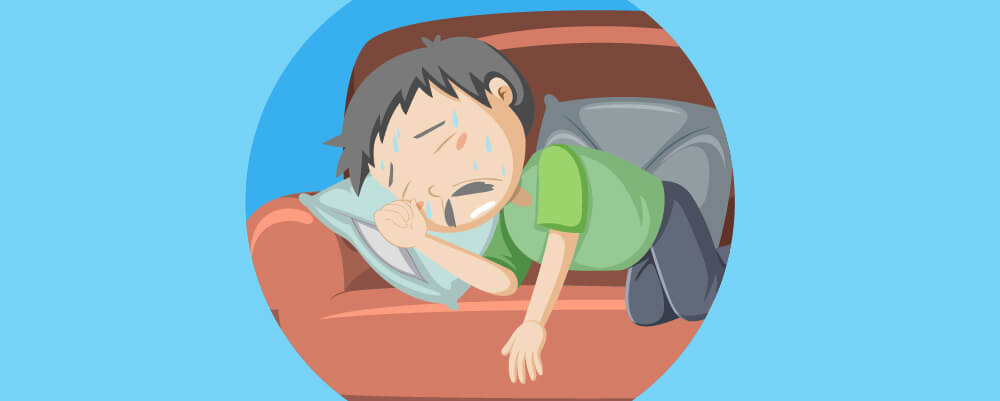
Although the phenomenon is called “Night Sweats,” it describes excessive sweating while you are sleeping. This isn’t a condition that hits you as soon as the sun goes down but instead drenches you when you are in a state of unconsciousness.
If you wake up and find yourself needing to change clothes or even your sheets, then you are experiencing night sweats.
Are Night Sweats Common?
Night sweats are most common among people aged between 41 and 55. A study using 2,000 participants monitored and noted that 41% of the participants reported night sweats.
This suggests that certain age groups experience this condition a lot, whereas other age groups hardly experience it at all.
One of the main factors in night sweats was menopause, which explained the 41 to 55 age group surge, but there were other causes too.
Causes Of Night Sweats

Usually, when we sweat, our skin is trying to regulate our core body temperature. If we were sick, our bodies would fight off the virus, and those actions would cause us to heat up; therefore, we need to sweat to keep cool. If we were to exercise, we would heat up from the movement. We would need our glands to cool down our heart rate.
When we experience night sweats, it means our body is trying to regulate our temperature while we should be in a state of rest. This means something is happening in your body, which may or may not be a problem.
Here are some causes of night sweats:
Menopause
Menopause is the main reason why people experience night sweats. Menopause is when the female body prepares itself for infertility. Just like with puberty, the process takes many years to complete as it changes fundamental hormone levels. The hormones in question are estrogen and progesterone.
Many of those going through menopause will experience hot flashes too. This is when your body feels outrageously hot (no matter the actual weather), as if you were burning off a fever. Hot flashes only last for a few minutes but can happen multiple times a day and affect 85% of those experiencing menopause.
Night sweats are not as common, but they still impact 64% of the same demographic. Because menopause takes years to complete, those going through this change will experience disturbed sleep for many years before finally reaching a state of peace. This can have knock-on effects, including bad moods, short-term memory lapses, and weight gain.
Some Medications
There are some medications used throughout western medicine that are known to cause night sweats. If you are experiencing the symptoms of night sweats, look at the medication you are using to see if you can find the term “Hyperhidrosis” in the warning leaflet.
This term is the scientific name for night sweats. If you do manage to find the cause in your medication, then you can tell your doctor that a change in pills may be needed.
The most common medications that cause Hyperhidrosis are antidepressants, steroids, and those used to lower fevers.
Antidepressants can cause sweating, as your neurological reaction to over-examining the world around you and putting yourself in “fight or flight mode” is still active although you are not feeling the consequences of it. This means your body is still trying to keep you cool as it suspects you will be over-exerting yourself.
Hormonal Problems
Similar to the issue surrounding menopausal night sweating, people who experience hormonal imbalances need to regulate their body too. Anything that creates change in the endocrine system will have a knock-on effect on the body’s ability to understand temperature.
With no accurate temperature measuring, the body then overreacts to any slight change in temperature, for example, being under a blanket.
A 2017 study showed that transgender people who take hormone replacement tablets would often be diagnosed with sleeping problems because of the change to their endocrine system.
People who suffer from thyroid overactivity, diabetes, abnormal sugar level, and abnormal sex hormones will likely have side effects that affect the part of the brain that regulates temperature. This is known as hypothalamic dysfunction and contributes to hormone imbalances which lead to night sweats.
Certain Infections
There are many infections that can cause night sweats. As the body fights off the invasion of bacteria or viruses in our bodies, two things happen. The first is that our body is causing more activity than normal, creating a domino effect of kinetic energy, which naturally raises our temperature.
The second is that our body forces our temperature to rise on purpose. This second effect is to basically “smoke out” the infection and make the environment so unpleasant for it that it will eventually die off.
Of course, this method is dangerous as our temperature should stay at around 98.6 degrees Fahrenheit (37 degrees Celsius).
Some infections are more commonly known for the night sweating symptoms. These include Tuberculosis, HIV (Human Immunodeficiency Virus), fungal infections, and bacterial infections.
Certain Cancers
In the same vein as infections, there is a form of cancer that starts off when our body is fighting off a disease. The cancer starts in the immune system itself, specifically the lymphocytes (these can be the lymph nodes, bone marrow, spleen, and others).
The cancer fights off the infection and then continues to attack the body even if the invading bacteria has been defeated. Just like with an infection, the body reacts by overheating in its attempt to flush out the invisible enemy, which causes you to sweat at night.
There are other cancers that act in the same way as this, which is why unexpected night sweats can be the first sign of cancer. If you are noticing unexplained weight loss and unexplained fevers, then you should tell your doctor so they can scan your body for potential cancers.
Anxiety
If you are someone who lives with chronic anxiety, you may notice that the nights are particularly uncomfortable. This is because your body is reacting to a stress response.
You might have had a nightmare, which would kickstart your heart rate, and therefore your body temperature. As your body tends to be overstimulated, this then doubles in pressure, leading to physical symptoms of distress.
You can ask your doctor for anti-anxiety medication, but you will need to explain your reasons; otherwise, they might give you the medication which triggers night sweats, as we explained above. If you already are suffering from this nightly drenching, then your doctors will need to figure out the best way to circumvent this issue becoming worse.
Stress
If you are someone who lives with chronic anxiety, you may notice that the nights are particularly uncomfortable. This is because your body is reacting to a stress response. You might have had a nightmare, which would kickstart your heart rate, and therefore your body temperature.
As your body tends to be overstimulated, this then doubles in pressure, leading to physical symptoms of distress.
You can ask your doctor for anti-anxiety medication, but you will need to explain your reasons; otherwise, they might give you the medication which triggers night sweats, as we explained above. If you already are suffering from this nightly drenching, then your doctors will need to figure out the best way to circumvent this issue becoming worse.
Hyperthyroidism
Hyperthyroidism is a condition of the thyroid gland. When the gland produces more thyroid hormones than the body needs, the area starts to inflame. This has a knock-on effect on your body, making you nervous, shaky, weak, and sweaty.
Your body doesn’t know what to do with all of this unnecessary energy and so finds a way to burn it off.
Hypoglycemia
Hypoglycemia is the scientific word for low blood sugar. We need blood sugar (or glucose) to give our cells the energy they need to perform. If you don’t have enough energy, your body cannot perform its essential functions. This means you can become dizzy, have blurry vision, and become tired.
Sometimes your body thinks it is under attack and so will start to defend itself. This is why your heart will beat faster, your skin starts to tingle with adrenaline, and your body begins to sweat.
This can happen at any time in the day or night, but if it happens at night, you are less likely to realize you are depleting. This is why you can end up with heavy night sweats. To prevent this, you should eat something sweet before bed. Without it, you may lose consciousness or have a seizure.
How To Treat Night Sweats:
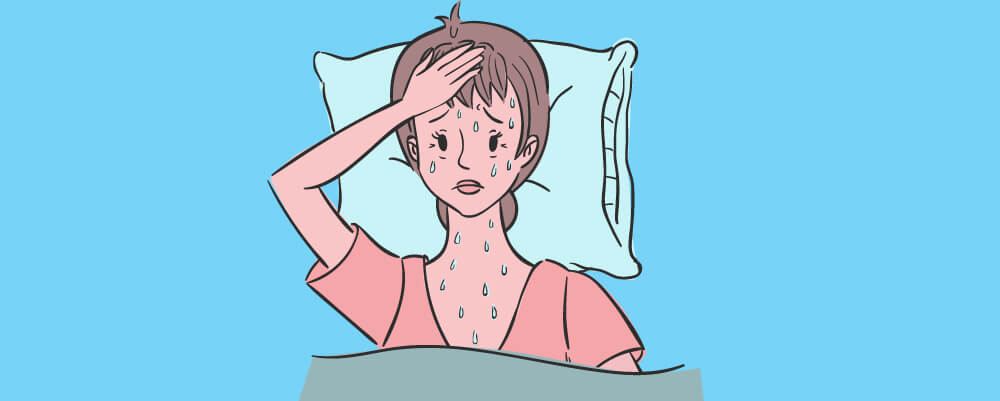
Depending on why your symptoms have appeared, there is a myriad of ways to treat the problem.
Exercise Daily
If you are someone with a hormone imbalance or high stress and anxiety levels. Then you should do 20 minutes of exercise daily. This exercise should raise your heart rate and make you breathless.
Depending on your current activity level, this could mean a 20-minute walk around your local park, a swim in your local pool, or an intense workout following a youtube video.
The idea is that your excess energies caused by the imbalance and stress will have an outlet. You will be using these energies before they peak in the night, thereby reducing the amount of imbalance through your evening.
Of course, this is not a cure for your main issues but a treatment for the sweating.
Drink Plenty Of Water
Before you go to bed, fill an insulated flask with cold water. This way, you can keep the water cold throughout the night, and you can take a sip to cool off if you wake up feeling comfortably warm.
You can use a plain old glass, but depending on your location, that water will become warm and so won’t have the cooling effect that a cold drink could provide.
In general, night sweaters should be drinking more water as they will be using up their hydration more than they should. To make sure you don’t get headaches or have a scratchy mouth, you need to keep on top of your water levels.
Normally a person should drink between 2,200 ml and 3,000 ml of water a day. Night sweaters should add another 1,000 ml to balance their sweating needs.
Avoid Eating 2-3 Hours Before Bed
Before you go to bed, fill an insulated flask with cold water. This way, you can keep the water cold throughout the night, and you can take a sip to cool off if you wake up feeling comfortably warm.
You can use a plain old glass, but depending on your location, that water will become warm and so won’t have the cooling effect that a cold drink could provide.
In general, night sweaters should be drinking more water as they will be using up their hydration more than they should. To make sure you don’t get headaches or have a scratchy mouth, you need to keep on top of your water levels.
Normally a person should drink between 2,200 ml and 3,000 ml of water a day. Night sweaters should add another 1,000 ml to balance their sweating needs.
Eat a Healthier Diet
There are some foods which make the sweating worse. For example, spicy foods can keep their naturally hot ingredients at the tip of your body’s digestion system. This means that the effects of sweating caused by the spicy food can linger well into the night.
Alcohol is another diet type that you should avoid. Technically, alcohol is a type of poison, and if you drink too much of it, your body will become disorientated. Of course, this is why most of us drink it, but the side effect is that your body will try to flush it out of your system.
Just like with an infection, your body is desperate to reject this substance and so will overheat to protect itself. If you stop drinking while you are experiencing these night sweats, then you can reduce the number of triggers your body is receiving.
Certain Supplements & Medications Can Help
There are some foods which make the sweating worse. For example, spicy foods can keep their naturally hot ingredients at the tip of your body’s digestion system. This means that the effects of sweating caused by the spicy food can linger well into the night.
Alcohol is another diet type that you should avoid. Technically, alcohol is a type of poison, and if you drink too much of it, your body will become disorientated. Of course, this is why most of us drink it, but the side effect is that your body will try to flush it out of your system.
Just like with an infection, your body is desperate to reject this substance and so will overheat to protect itself. If you stop drinking while you are experiencing these night sweats, then you can reduce the number of triggers your body is receiving.
When To Visit a Doctor About Your Night Sweats:
If you’re not sure if your night sweats are bad enough to talk to a doctor, use the advice below to help you determine if a trip to the hospital is warranted.
If Your Night Sweats Are Frequent
If your night sweats are frequent, this isn’t necessarily a sign that something terrible is wrong. By themselves, these night sweats will be disturbing your sleep, which can have a knock-on effect on other parts of your life. You need your sleep to digest the information gathered in your day, which means storing your short and long-term memories.
You also need sleep to rest your body; without it, you will become fatigued and weak. If your night sweats disturb your sleep too much, this could snowball into a significant issue. So talk to your doctor to get it under control.
That being said, You could have a serious medical condition, especially if you have unexplained weight loss, a recurring cough, or a high fever. These are the symptoms of many major illnesses, including cancer. If your night sweats have been lasting for a week, and you also have these issues too, call your doctor to make sure everything is okay.
Persistent
If your night sweats are frequent, this isn’t necessarily a sign that something terrible is wrong. By themselves, these night sweats will be disturbing your sleep, which can have a knock-on effect on other parts of your life.
You need your sleep to digest the information gathered in your day, which means storing your short and long-term memories. You also need sleep to rest your body; without it, you will become fatigued and weak.
If your night sweats disturb your sleep too much, this could snowball into a significant issue. So talk to your doctor to get it under control.
That being said, You could have a serious medical condition, especially if you have unexplained weight loss, a recurring cough, or a high fever. These are the symptoms of many major illnesses, including cancer. If your night sweats have been lasting for a week, and you also have these issues too, call your doctor to make sure everything is okay.
Disturbing Your Sleep
We have talked a lot about disturbed sleep during this section, but we cannot stress enough how important sleep is. Our body needs to complete four stages of sleep, like a cycle, to make sure that you are fully prepared for the coming day.
Stage 1 simply helps you relax and drift off. Stage 2 is a deeper state. Your electrical brain waves are active but slow. It’s at this point that your brain is storing data and recovering from the day before. Without it, your memory and understanding will lessen as your cognitive functions won’t have a chance to recharge.
The third stage is when your body reaches its lowest level of stress and is the most important stage to make you feel refreshed the next day.
The last stage is when you begin to dream. This stage has had lots of research dedicated to it, and many studies show that without completing this stage, your long-term memories will not be stored.
The short-term memory should have already been organized at this point, but your body needs this dream stage to understand what is important enough to keep forever and what is something that can naturally fade.
Without completing all four stages of your sleep cycle, you will have trouble recalling information from your long-term memory. You will also have difficulty using your body as you once had, as it hasn’t had the chance to recover.
Affecting Your Daily Life
All of this accumulates to your daily life becoming affected. If you can shrug off the night sweats that have no additional issues surrounding them, then you can wait for your body to realign itself.
If you notice that your days are becoming tiresome, you are going through rapid mood changes, and you’re generally not feeling well, then you should talk to your doctor to get yourself back to normality.
Occurring Along With Other Health Changes
All of this accumulates to your daily life becoming affected. If you can shrug off the night sweats that have no additional issues surrounding them, then you can wait for your body to realign itself.
If you notice that your days are becoming tiresome, you are going through rapid mood changes, and you’re generally not feeling well, then you should talk to your doctor to get yourself back to normality.
How To Prevent Night Sweats:
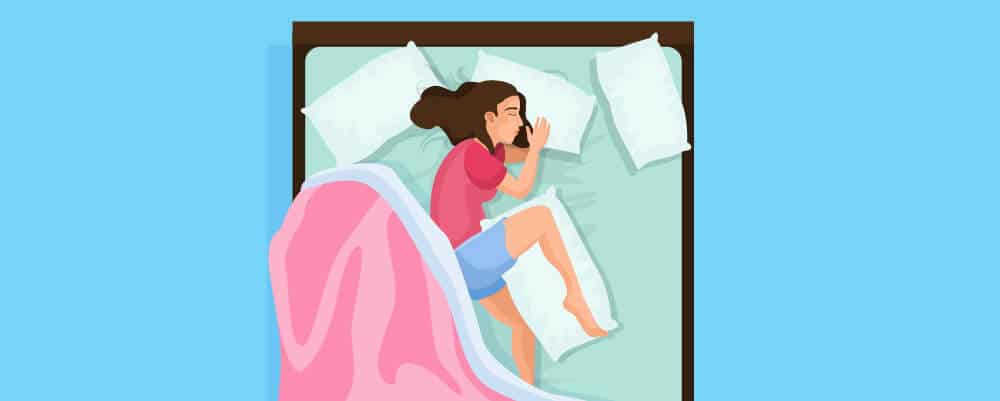
All of this accumulates to your daily life becoming affected. If you can shrug off the night sweats that have no additional issues surrounding them, then you can wait for your body to realign itself.
If you notice that your days are becoming tiresome, you are going through rapid mood changes, and you’re generally not feeling well, then you should talk to your doctor to get yourself back to normality.
Reduce Alcohol & Caffeine Consumption
Switching to decaffeinated drinks will allow your body to reach a state of natural tiredness throughout the day. Caffeine is designed to keep you awake. It is a natural psychoactive substance which energizes you and brings your alertness back to focus. This is not what you need when you are already struggling to sleep.
Just like anxiety keeps your body on alert, even if you do sleep after drinking a caffeinated drink, your body will still be running on high. Switching to decaf will stop this from being an ongoing issue.
If you are a heavy coffee drinker, you might find that going “cold-turkey” will give you headaches. In that case, we recommend slowly lowering your caffeine intake until you can remove it from your diet without concern.
Alcohol, unlike caffeine, is a depressive drink. It will make you sleepy, which you might think will help you drift off, but because alcohol is a type of mild poison, your body will try to expel it in the night.
Like we have said before, anything that makes your body fight hard to keep you healthy will cause you to sweat. Avoiding alcohol should be your first step to preventing night sweats.
Limit Tobacco
Cigarettes are another substance that can cause your body unnecessary distress. Again your body will try and expel the toxic fumes you have consumed, and it will do so in the same way it will expel an infection.
If you are addicted to smoking, reducing your habits can be super hard. Depending on your temperament, we do not recommend cutting yourself off completely and instead suggest limiting or reducing the amount of tobacco you have.
To help you prevent the night sweats, you should organize your reduced smoking around the nighttime. Think about when you will next crave a cigarette and how long you can wait between tokes. Then set up a new schedule that gives you 2 or 3 hours of healing time before you go to bed.
This method is similar to our food suggestion. As we have said before, your body will have time to digest and settle before it tries to rest completely.
If you go to bed straight after smoking, your body has to deal with the smoke and try to rest at the same time, thereby hurting your sleeping cycle.
Avoid Illegal Drugs
Illegal drugs act in the same way as tobacco and alcohol. Your body will recognize that something terribly negative has entered your body and will try to expel it by overheating your body. This, in turn, causes night sweats.
The difference is that, depending on the drug you have taken, there are more problems attached to the substances. There could be inhibitors that don’t tell your body that it needs to cool down, and so your hot flashes occur sporadically through the night.
There could be hallucinogens that prevent your body from resting at all. There could be a myriad of effects happening to your body all at once.
There are not a lot of studies around illegal drugs, as it can be hard for researchers to gain access to the substances and then to get permission to do their experiments. This means that most of our data come from current users’ experiences.
One thing that keeps on cropping up is that recovering drug users experience night sweats more than non-recovering. This might cause the individual to reach for another hit to calm down their body.
This will not help your recovery. Instead, you should talk to your sponsor, therapist, and/or doctor to get the best advice to keep you on track and healthy.
Try To Maintain a Healthy Weight
This advice is to do with overeating and undereating in comparison to your exercise level. This is because undereating will cause you to have lower blood sugar levels, as discussed above, and overeating will force your body to digest food for longer and stretch into the nighttime hours to finish the job.
We have mentioned blood sugar before, but some people falsely believe that under-eating will help them lose weight to reach their health or beauty goal. Having a healthy weight means exercising your body and eating enough substances to reach these exercise goals.
If you undereat, your body will overreact to what it perceives as an attack over its glucose levels and so will try to flush out the imagined enemy, thereby causing night sweats.
If you overeat, your body will not have the room or strength to digest your food in the expected amount of time. This means you will feel bloated for longer. As we said before, you should not eat 2 or 3 hours before you go to bed so that your body can finish digesting before it heads over to the task of memory logging and muscle relaxing.
If you have overeaten, this 2 or 3-hour time scale we have given you will be irrelevant. Your body will still be digesting the food and so will naturally continue into the night, thereby overworking your body as it tries to rest.
Keep Your Room At Night Cooler
Crack open a window or switch on a fan. If your overall body temperature is kept cool, then this can stop your body from overheating and sweating. If you are suffering from an infection, your body might not be able to recognize the colder temperature.
This is because your body is not reacting to heat but reacting to an invasion. The cooler room should be able to keep your body cool, though, as it battles into the night.
If you are going through a hormonal change, the cooler room could be just what your body needs to settle. The moving airflow and cool temperature can help your body regulate its needs while dealing with the changes in your body.
We recommend adding a product like the BedJet to your sleeping area and to buy a made in the USA mattress to ensure they have used a high-quality foam.
Summary
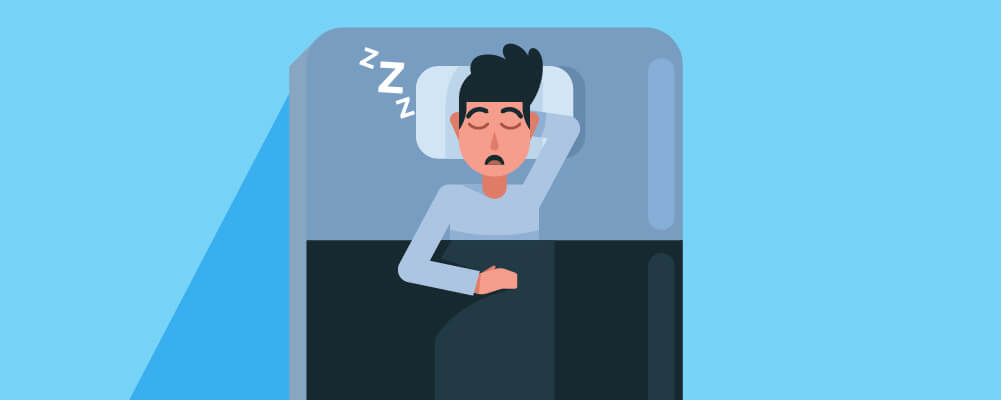
If you suffer from night sweats, look back on your life and figure out what has changed. Have you taken new medication? Is it likely that you are starting menopause? Have there been other changes that you have noticed?
These questions can help you figure out what you are dealing with and if you need to see a doctor. If you are at all worried about your health, talk to a doctor to see how they can help. In the meantime, use our advice to make the nights less stressful.

